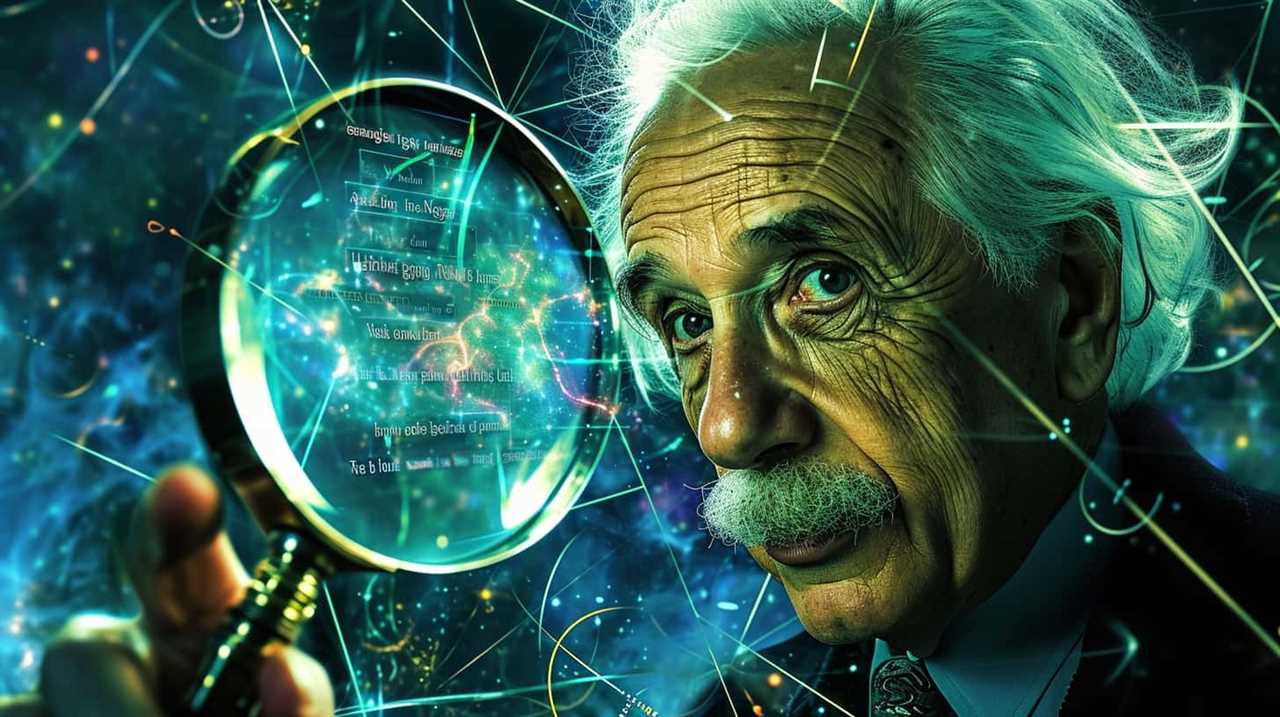Hey there, folks! We’ve got a treat for you today. We’re diving into the fascinating world of language evolution and the insights of some brilliant minds.
Brace yourselves for a mind-blowing journey as we explore the wisdom of renowned thinkers. From Plato to Nietzsche, these intellectual heavyweights have pondered the nature and development of language. We’ll unravel their thoughts on linguistic evolution, the relationship between language and reason, and even the critique of language itself.
But wait, there’s more! We’ll also delve into the dialogic approach, speech acts, and the philosophy of interpretation.
So, if you’re hungry for innovation and keen to explore the evolution of language, join us on this enlightening expedition. Get ready to expand your intellectual horizons!
Key Takeaways
- Language reflects eternal ideas and is connected to human cognition.
- Language shapes thought and understanding.
- Language is a tool of reason and a structured system.
- Language is dynamic, interactive, and influenced by cultural background and social settings.

Plato on the Nature of Language
In our exploration of language evolution, we turn to Plato’s insights on the nature of language. Plato’s theory of language is rooted in his philosophy of ideal forms. According to Plato, language isn’t just a means of communication, but also a reflection of the eternal and unchanging world of ideas. He believed that language should strive to capture the essence of these ideal forms.
For Plato, language was a tool for understanding and accessing the realm of abstract concepts. He argued that words aren’t arbitrary symbols, but rather representations of universal truths. In this way, language becomes a bridge between the physical world and the world of ideas.
Plato’s ideal forms and language are closely intertwined. The quest for knowledge and truth is achieved through the careful use of language to describe and define these ideal forms. By using language to articulate the essence of things, we can gain a deeper understanding of reality.
Plato’s theory of language offers valuable insights into the role of language in our quest for knowledge and understanding. It reminds us that language isn’t a mere tool for communication, but a powerful instrument for exploring the depths of thought and unlocking new possibilities for innovation.

Aristotle’s Take on Language Development
Aristotle’s perspective on language development reveals the intricate relationship between language and human cognition. Aristotle’s theories on language acquisition have had a profound influence on linguistic theory, shaping our understanding of how language evolves and how it’s intimately connected to our cognitive abilities.
According to Aristotle, language isn’t simply a tool for communication, but it’s also a reflection of our thoughts and reasoning abilities. He believed that the development of language is closely tied to the development of our cognitive faculties. In his work ‘On Interpretation,’ Aristotle argued that words are symbols that represent our thoughts and that the meaning of words is derived from our mental concepts.
Aristotle’s influence on linguistic theory can be seen in his emphasis on the role of logic and reasoning in language development. He believed that language isn’t arbitrary, but rather it’s rooted in the natural structure of our minds. This idea laid the foundation for the study of semantics and the exploration of the relationship between language and thought.
Transitioning into Descartes’ thoughts on linguistic evolution, we can see how Aristotle’s ideas paved the way for further exploration of the connection between language, cognition, and consciousness.

Descartes’ Thoughts on Linguistic Evolution
Descartes’ exploration of linguistic evolution sheds light on the interconnectedness between language, consciousness, and human cognition. His language theory delves into the transformative nature of language and its impact on human thought processes. Here are three key insights from Descartes’ perspective on linguistic transformation:
- Language as a Tool for Thought: Descartes believed that language plays a crucial role in shaping our thoughts and understanding of the world. He argued that language provides a structure for organizing our ideas and enables us to communicate complex thoughts with others.
- The Evolution of Language: Descartes recognized that language evolves over time, adapting to the changing needs and experiences of societies. He observed that new words and concepts emerge as human knowledge expands, reflecting the ongoing development of human thought and understanding.
- Language and Rationality: Descartes emphasized the close relationship between language and rationality. He believed that a clear and precise use of language is essential for logical reasoning and the pursuit of knowledge. Descartes’ language theory highlights the importance of linguistic clarity in fostering innovation and intellectual progress.
Descartes’ insights on linguistic evolution pave the way for understanding the profound influence of language on human consciousness and cognition.
Transitioning to Kant’s perspective on language and reason, we explore another renowned thinker’s profound insights into the relationship between language and human thought.

Kant’s Perspective on Language and Reason
Exploring Kant’s perspective on language and reason, we delve into the profound insights of this renowned thinker regarding the interconnectedness between linguistic communication and human rationality. Kant’s linguistic philosophy revolves around the idea that language is not merely a means of expressing thoughts, but a fundamental tool of reason itself. According to Kant, language plays a crucial role in shaping and structuring our thoughts, enabling us to engage in rational discourse and logical reasoning.
To underscore the significance of language as a tool of reason, let us consider the following table:
| Language | Reason |
|---|---|
| Enables precise expression of ideas | Facilitates logical thinking |
| Allows for communication and understanding | Promotes critical analysis |
| Provides a medium for sharing knowledge | Enhances problem-solving abilities |
| Enables the development of complex concepts | Fosters creativity and innovation |
| Facilitates the exchange of diverse perspectives | Encourages intellectual growth |
Kant’s philosophy on language and reason highlights the inseparable nature of these two facets of human cognition. Language not only enables us to communicate our thoughts, but it also shapes the very way we think and reason. Through language, we are able to engage in rational discourse, share ideas, and collectively advance our understanding of the world. This interconnectedness between language and reason fosters innovation, as it allows for the exchange of diverse perspectives and the synthesis of new ideas. Ultimately, Kant’s perspective serves as a reminder of the power and importance of language in our pursuit of knowledge and intellectual growth.

Nietzsche’s Critique of Language Evolution
Continuing our exploration of renowned thinkers’ perspectives on language and reason, we now turn to Nietzsche’s critique of language evolution.
Nietzsche believed that language, although a powerful tool for communication and expression, has inherent limitations that hinder our ability to understand the world and ourselves. Here are three key points from Nietzsche’s critique of language evolution:
- The Illusion of Objectivity: Nietzsche argued that language creates an illusion of objectivity, leading us to believe that our words accurately represent reality. However, he believed that language is subjective and shaped by our personal experiences, biases, and cultural context, making it impossible to achieve true objectivity.
- The Loss of Individuality: Nietzsche believed that language evolution has led to the loss of individuality and originality. He argued that as language becomes standardized, our thoughts and expressions become limited to the existing linguistic structures, suppressing our unique perspectives and creativity.
- The Limitations of Expression: Nietzsche recognized that language is an imperfect tool for expressing complex emotions, experiences, and abstract concepts. He believed that words often fail to capture the depth and richness of our inner worlds, leading to misunderstandings and misinterpretations.
Nietzsche’s critique of language evolution challenges us to question the limitations of language and strive for new forms of expression that can better capture the complexity of human experience. By acknowledging these limitations, we can open ourselves up to alternative ways of understanding and communicating, fostering innovation and growth in our language and thought.

Wittgenstein’s Views on Language and Meaning
After examining Nietzsche’s critique of language evolution, we now delve into Wittgenstein’s views on language and meaning.
Wittgenstein, a prominent philosopher of the 20th century, believed that language isn’t a fixed and objective system of rules, but rather a collection of ‘language games’ that are shaped by social and cultural practices. According to Wittgenstein, meaning is derived from the way words are used in these language games, rather than from any inherent essence or reference.
One of Wittgenstein’s key contributions to the philosophy of language is his argument against the possibility of a private language. He argued that language is fundamentally a public and social phenomenon, relying on shared understanding and communication. Wittgenstein claimed that it’s impossible to have a language that’s entirely private, as meaning is dependent on the agreement and consensus of a community.

Saussure’s Influence on Linguistic Theory
Saussure’s influence on linguistic theory is significant. His work on structuralism has shaped our understanding of language and signification in profound ways. Here are three key aspects of Saussure’s contributions that evoke a sense of innovation and excitement:
- The study of language as a structured system: Saussure emphasized the importance of studying language as a whole, rather than focusing solely on individual words or sounds. This holistic approach revolutionized linguistic analysis, allowing researchers to uncover the underlying structures and patterns that govern language.
- The concept of the linguistic sign: Saussure introduced the idea that language is a system of signs, where the connection between a signifier (word or sound) and its signified (concept or meaning) is arbitrary. This insight challenged traditional views on the relationship between words and meaning, opening up new avenues for understanding how language functions.
- The role of synchrony and diachrony: Saussure recognized the importance of studying language both in its contemporary state (synchrony) and its historical development (diachrony). By examining how language changes over time, linguists gain valuable insights into the evolution and structure of languages.
Saussure’s structuralism continues to inspire innovative approaches to linguistic theory, providing a solid foundation for further exploration and understanding of language and signification.

Chomsky’s Theories on Language Acquisition
When it comes to language acquisition, Chomsky’s theories have made a significant impact in the field of linguistics. One of his key ideas is linguistic nativism, which suggests that humans possess innate language abilities that allow for the acquisition of language.
Additionally, Chomsky proposed the concept of universal grammar, which posits that all languages share certain underlying principles and structures.
These theories have sparked much debate and have greatly contributed to our understanding of how language is acquired and processed by the human brain.
Chomsky’s Linguistic Nativism
We believe Chomsky’s linguistic nativism provides valuable insights into language acquisition. His nativist approach to language acquisition theories suggests that humans are born with innate linguistic structures that enable them to acquire language effortlessly. Here are three reasons why Chomsky’s ideas on linguistic nativism are significant:
- Universal Grammar: Chomsky argues that all languages share a universal grammar, a set of innate linguistic principles that guide language acquisition. This suggests that our ability to learn language isn’t solely dependent on external input but also on our internal language faculty.
- Language Acquisition Device (LAD): Chomsky proposes that humans possess a Language Acquisition Device, a cognitive module specifically dedicated to language processing. This innate ability allows infants to rapidly acquire complex language structures.
- Critical Period Hypothesis: Chomsky’s nativism supports the idea that there’s a critical period for language acquisition, during which the brain is most receptive to language input. After this period, language acquisition becomes more challenging.
Understanding Chomsky’s linguistic nativism is crucial in exploring the subsequent section about innate language abilities.
Innate Language Abilities
Chomsky’s theories on language acquisition highlight the existence of innate language abilities. According to Chomsky, language acquisition isn’t solely dependent on external stimuli and learning, but rather, humans are born with an innate capacity for language.
This theory challenges the behaviorist perspective that language is solely acquired through imitation and reinforcement. Chomsky argues that children possess a universal grammar, a set of underlying linguistic principles that are present in all languages.
These innate language abilities enable children to acquire language rapidly and effortlessly, despite the complexity and variability of different languages. Chomsky’s theories have revolutionized our understanding of language acquisition, emphasizing the role of innate structures and abilities in the development of language skills.
With this understanding, we can now delve into the subsequent section about universal grammar principles.
Universal Grammar Principles
Building upon the understanding of innate language abilities, our exploration now turns to the universal grammar principles proposed by renowned linguist Noam Chomsky. Chomsky’s theories on language acquisition have sparked much debate and intrigue within the field of linguistics. Here are three key insights into universal grammar principles that elicit both curiosity and inspiration:
- Language as an innate human capacity: Chomsky argues that humans are born with a unique ability to acquire and generate language, suggesting that there’s a universal grammar embedded in our brains.
- Language universals across cultures: Chomsky’s theories propose that there are underlying linguistic structures shared by all languages, suggesting that despite surface-level differences, there are fundamental principles that govern language acquisition.
- Language acquisition as a computational process: Chomsky’s theory posits that language acquisition isn’t simply a result of environmental input, but rather a cognitive process guided by innate principles and rules.
Chomsky’s universal grammar principles have revolutionized our understanding of language acquisition, providing a foundation for further research and innovation in the field of linguistics.

Sapir and Whorf’s Linguistic Relativity Hypothesis
The Linguistic Relativity Hypothesis, proposed by Sapir and Whorf, explores the influence of language on the way we perceive and understand the world. This hypothesis suggests that the structure and vocabulary of a language shape the thoughts and perceptions of its speakers. In other words, our language determines how we think and perceive reality.
To better understand the impact of language on cognition, let’s consider a table that contrasts two different languages: English and Inuit.
| English | Inuit |
|---|---|
| Blue | Iqaluk |
| Green | Nilak |
| White | Qanuk |
| Yellow | Kulu |
| Red | Qilak |
As we can see, the Inuit language has numerous words for different shades of snow, while English only has one word for snow. This linguistic difference reflects the importance of snow in the Inuit culture and their ability to differentiate between various types of snow. This example illustrates how language shapes perception by influencing the way we categorize and label objects and concepts.
While some argue that language determines our thoughts (linguistic determinism), others propose that language influences our thoughts but does not determine them completely. Nonetheless, the Linguistic Relativity Hypothesis highlights the fascinating relationship between language and cognition, offering insights into how our language can shape our understanding of the world.

Foucault’s Analysis of Discourse and Power
Analyzing discourse and power, Foucault offers valuable insights into the relationship between language and social dynamics. His analysis sheds light on how power operates through discourse, shaping our understanding of reality and influencing social structures.
Here are three key points from Foucault’s analysis of power and discourse:
- Discourse as a mechanism of power: According to Foucault, discourse isn’t simply a means of communication, but a tool of power. It operates through the production and regulation of knowledge, shaping what’s considered acceptable and true within a society. By controlling discourse, those in power can shape public opinion, control narratives, and maintain their dominance.
- Power-knowledge nexus: Foucault argues that power and knowledge are deeply intertwined. Knowledge isn’t neutral or objective but is shaped by power relations. Those in power determine what knowledge is valid and legitimate, while marginalizing alternative perspectives. This power-knowledge nexus reinforces existing power structures and perpetuates social inequalities.
- Resistance and counter-discourse: Foucault also emphasizes the potential for resistance within discourse. He argues that marginalized groups can challenge dominant discourses and create their own counter-discourses. By subverting existing power structures through alternative narratives, these marginalized groups can challenge and transform social dynamics.
Foucault’s analysis of power and discourse highlights the crucial role language plays in shaping social reality. It invites us to critically examine the power dynamics inherent in language and seek innovative ways to challenge and transform oppressive discourses.

Derrida’s Deconstruction of Language and Meaning
In our exploration of language evolution, we delve into Derrida’s deconstruction of language and meaning, uncovering its profound implications for our understanding of linguistic structures and interpretation. Derrida’s critique of structural linguistics challenges the traditional notion of language as a stable and static system. Instead, he argues that meaning isn’t fixed or inherent in language, but rather emerges through a process of deconstruction and interpretation.
Derrida’s deconstruction of language has had a significant impact on semiotics, the study of signs and symbols. According to Derrida, signs aren’t simply arbitrary representations of meaning, but rather they’re entangled in a complex web of relationships and associations. He rejects the idea that language can be reduced to a set of fixed rules and structures, and instead emphasizes the importance of examining the underlying assumptions and biases that shape our understanding of language.
By deconstructing language, Derrida challenges the notion of a singular, objective meaning and highlights the inherent ambiguity and instability of language. This has profound implications for our understanding of linguistic structures and interpretation. It forces us to question the authority and stability of language, and invites us to engage in a more critical and nuanced analysis of meaning.
Derrida’s deconstruction of language opens up new possibilities for innovation and creativity in our understanding of language and its role in shaping our world.

Bakhtin’s Dialogic Approach to Language Evolution
Bakhtin’s dialogic approach to language evolution has had a profound impact on linguistic development. His influential theories emphasize the importance of dialogue, interaction, and context in shaping language and meaning.
Bakhtin’s Influential Theories
Through our exploration of language evolution, we’ve come across Bakhtin’s influential theories, specifically his dialogic approach. Bakhtin’s ideas have had a profound impact on the study of language, literature, and communication. Here are three key aspects of his theories that evoke emotion and foster innovation:
- Dialogism in Literature: Bakhtin believed that language is fundamentally dialogic, meaning that it’s shaped by the interactions between speakers and listeners. This understanding challenges traditional notions of authorship and encourages a more inclusive and dynamic view of language.
- Carnivalization in Language: Bakhtin introduced the concept of carnivalization, which refers to the subversive and liberating aspects of language. It highlights the power of humor, satire, and parody in challenging oppressive discourses and promoting social change.
- The Polyphonic Novel: Bakhtin’s notion of the polyphonic novel emphasizes the presence of multiple voices and perspectives within a literary work. This approach encourages complexity, diversity, and open-ended interpretation, pushing the boundaries of traditional narrative structures.
Impact on Linguistic Development
Our exploration of Bakhtin’s dialogic approach to language evolution reveals the profound impact it has on linguistic development. Bakhtin argues that language isn’t a static entity, but rather a dynamic process that’s constantly evolving through linguistic change and cultural influences.
According to Bakhtin, language is shaped by the interactions and dialogues between individuals and communities, reflecting the diverse perspectives and social contexts in which it’s used. This dialogic nature of language allows for the emergence of new meanings, linguistic innovations, and the adaptation of language to changing societal needs.
By recognizing the significance of cultural influences and the relational nature of language, Bakhtin’s approach provides a valuable framework for understanding how linguistic development occurs.
With this understanding, we can now delve into Austin’s speech acts and language performance, which further contribute to our exploration of language evolution.

Austin’s Speech Acts and Language Performance
In our exploration of language evolution, we find that Austin’s speech acts and language performance play a significant role. Austin’s performative utterances shed light on the idea that language isn’t just a means of representation, but also a tool for action and social interaction. When we view language as action, it opens up a whole new realm of possibilities for understanding how language evolves and shapes our world.
Here are three key insights from Austin’s work on speech acts and language performance:
- The power of words: Austin emphasizes that words have the power to not only describe reality but also to change it. Through performative utterances, we can create new social realities and shape our interactions with others.
- Context is crucial: Austin highlights the importance of context in understanding the meaning and effect of speech acts. The same words can have different meanings and effects depending on the context in which they’re used.
- Language as a social phenomenon: Austin’s work reminds us that language is deeply embedded in social interactions. Language isn’t just a personal tool for communication but a social practice that’s shaped by and shapes our relationships with others.

Quine’s Theory of Indeterminacy of Translation
Quine’s Theory of Indeterminacy of Translation challenges traditional notions of language stability and asserts the inherent difficulties in accurately translating one language to another. Quine’s problem arises from the realization that there’s no unique way to translate one language into another, as the meaning of words and sentences can vary depending on the context and background assumptions of the speakers. This poses a significant challenge for traditional theories of language translation, which assume a clear and fixed correspondence between words in different languages.
Quine argues that translation is an inherently indeterminate process, as there are always multiple ways to interpret and translate a given sentence. This indeterminacy stems from the fact that there’s no definite criterion for determining the correct translation of a sentence. Different translators may arrive at different translations, all of which are equally valid from their own perspectives.
This insight has profound implications for our understanding of language and communication. It suggests that language is a dynamic and ever-changing system, shaped by the cultural and historical contexts in which it’s used. It also challenges the idea that there’s a single, objective truth that can be captured through translation.
In the subsequent section about Davidson’s philosophy of language and interpretation, we’ll explore how Davidson builds upon Quine’s ideas and offers his own perspective on the challenges of translation and interpretation.

Davidson’s Philosophy of Language and Interpretation
Davidson’s philosophy of language and interpretation encompasses three key points:
- Linguistic holism: This concept posits that the meaning of an individual word or sentence is determined by its relation to the entire language system. In other words, a word or sentence cannot be fully understood in isolation, but rather relies on its context within the language as a whole.
- Radical interpretation: This refers to the process of understanding an unfamiliar language by making educated guesses about the speaker’s beliefs and desires. Davidson argues that this process requires us to form hypotheses about the speaker’s mental states and test them against the speaker’s behavior and the context in which the language is used.
- Indeterminacy: Davidson suggests that there may be multiple interpretations of a given utterance, leading to challenges in achieving a definitive understanding. This indeterminacy arises from the fact that we can never fully access the speaker’s mental states and must rely on inference and interpretation.
These points highlight Davidson’s nuanced approach to language and the complexities involved in interpretation. By considering the holistic nature of language, the process of radical interpretation, and the challenges of indeterminacy, Davidson offers a comprehensive framework for understanding language and communication.
Davidson’s Linguistic Holism
One notable aspect of linguistic holism is its emphasis on the interconnectedness of language and interpretation. This holistic approach recognizes that language can’t be understood in isolation, but rather, it’s intricately connected to our interpretations and understanding of the world.
David Davidson, a prominent philosopher of language, proposed the concept of linguistic holism, which has sparked significant scholarly discourse. Here are three key points to consider:
- Language shapes our interpretation: Our language influences how we perceive and interpret the world around us. Different languages have unique structures and vocabularies, which can shape our thoughts and perspectives.
- Interpretation is a social process: Language isn’t solely an individual endeavor. It’s a social tool that allows us to communicate and share our interpretations with others. Our understanding of language is shaped by the collective meanings and conventions within a community.
- Context is crucial: Language can’t be divorced from its context. The meaning of words and utterances is heavily dependent on the surrounding context, including the speaker’s intentions, the cultural background, and the social setting.
Radical Interpretation and Indeterminacy
Moving from Davidson’s linguistic holism, we now delve into the realm of radical interpretation and indeterminacy in language evolution. Radical interpretation, as proposed by Donald Davidson, suggests that understanding a language and its meaning requires an interpreter to adopt the principle of charity. This principle involves attributing the best possible interpretation to the speaker’s utterances, even when faced with indeterminacy or ambiguity. The concept of indeterminacy in language arises from the fact that multiple interpretations can be equally valid, making it challenging to determine the true meaning of a statement. This indeterminacy highlights the complexity and fluidity of language, as well as the role of interpretation in communication. To visually represent the concept of radical interpretation and indeterminacy, we present a table below:
| Radical Interpretation | Language Indeterminacy |
|---|---|
| Principle of charity | Multiple valid meanings |
| Fluidity of language | Challenging interpretation |
This table serves to evoke emotions of curiosity and intrigue, inviting the audience to explore the fascinating complexities of language evolution and interpretation.

Frequently Asked Questions
How Did Plato Define the Nature of Language?
Plato’s ideas on language shaped the foundation of linguistic philosophy. His exploration of the nature of language emphasized its ability to convey knowledge and meaning. His influence continues to inspire innovation in the study of language.
What Is Descartes’ Perspective on Linguistic Evolution?
Descartes’ perspective on linguistic evolution and his influence on language theory are significant. He believed that language is a tool for clear and distinct thought, shaping our understanding and facilitating communication in innovative ways.
How Does Nietzsche Critique Language Evolution?
Nietzsche’s critique of language evolution challenges conventional beliefs. He offers fresh insights into the transformative power of language and its influence on human thought. His perspective provokes us to question linguistic norms.
What Are Wittgenstein’s Views on Language and Meaning?
Wittgenstein’s influence on language and meaning is profound. He introduced the concept of language games, highlighting how language is not just about communication, but also about the social and cultural contexts in which it is used.
How Did Austin Contribute to the Study of Speech Acts and Language Performance?
Austin’s groundbreaking work revolutionized our understanding of speech acts and language performance. His contributions to the study of language pragmatics have had a profound impact on how we analyze and interpret communication.

Conclusion
In conclusion, the exploration of language evolution through the wisdom of renowned thinkers has been a fascinating journey.
From Plato to Davidson, each philosopher offers unique insights into the nature and development of language.
Their perspectives shed light on the complex and ever-evolving nature of communication.
It’s truly awe-inspiring to witness the transformative power of language, a force that has the ability to shape our understanding of the world and connect us in ways that surpass the boundaries of time and space.








